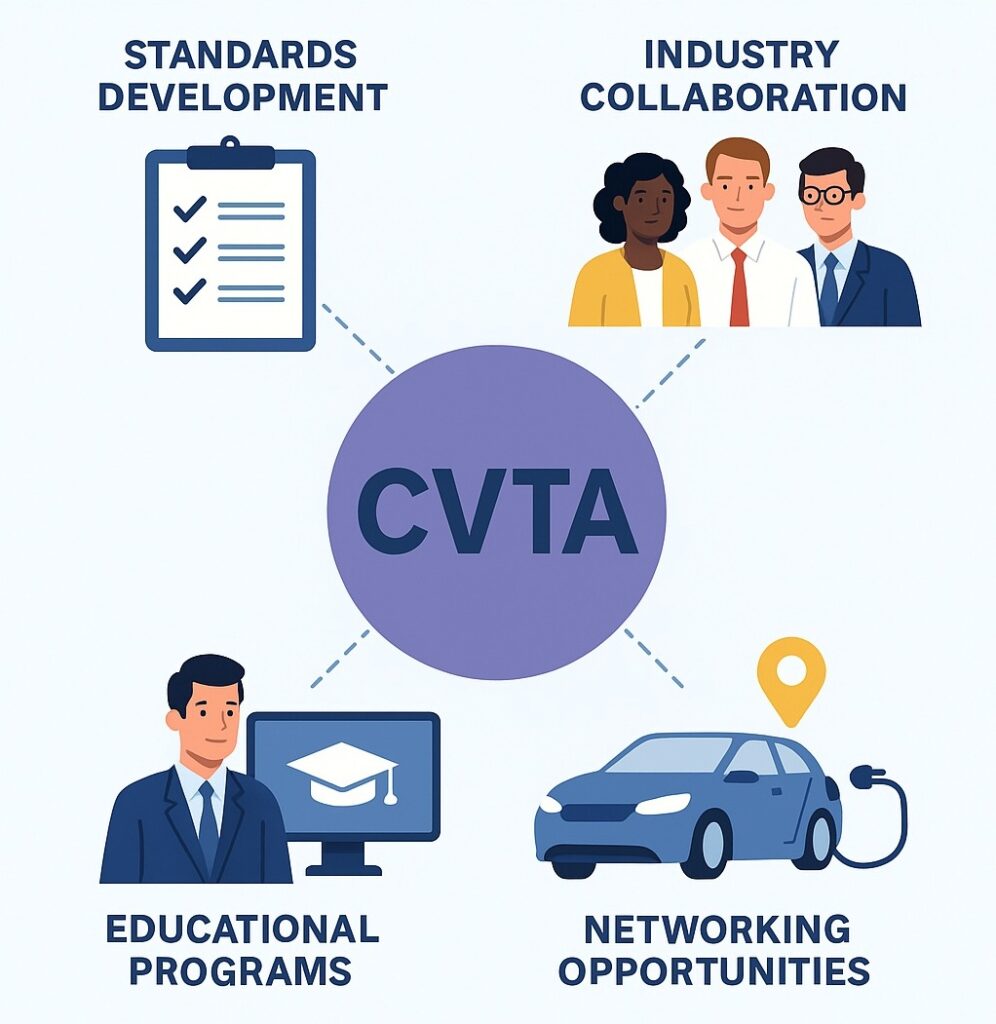By: Scott McCormick
The connected electric vehicle (EV) landscape is rapidly evolving, marked by technical complexity, fragmented standards, and the growing need for cross-industry collaboration. At the center of this transformation is the Connected Vehicle Trade Association (CVTA), a nonprofit organization helping to align stakeholders, develop educational programs, and drive the advancement of connected and electric vehicle technologies.
 You want to discover more a
You want to discover more a
bout the Connected Vehicle Trade Association – CVTA? Listen to the podcast session that this article summarizes – EVBusiness.Net/104
Also available on Spotify, Pandora, Audible, iHeartRadio & other podcast networks.
Unifying an Industry Through Collaboration and Standards
Since its formation in 2004, CVTA has worked to unite disparate sectors within the connected vehicle ecosystem. Originally established by a coalition of ten global automakers, the association was built to accommodate emerging players from telecom, cybersecurity, insurance, and beyond. Today, CVTA represents 24 different industries, all contributing to the evolution of connected EV technologies.
A core mission of CVTA is to promote the deployment of safe, efficient, and intelligent vehicle communication systems. These include vehicle-to-infrastructure (V2I), vehicle-to-vehicle (V2V), and vehicle-to-everything (V2X) technologies that support mobility, commercial services, and energy efficiency. CVTA continuously identifies gaps in standardization and serves as a voice in shaping regulations and compatibility frameworks around the globe.
Education, Credentialing, and Industry Readiness
One of the most impactful programs launched by CVTA is the Connected Vehicle Professional Credentialing Program. Since 2014, thousands of professionals worldwide have completed this course, gaining insights into connected vehicle hardware, communication protocols, safety systems, and the regulatory environment. The program is continuously updated to reflect changes in technology and policy, preparing participants to meet real-world industry demands.
Beyond credentialing, CVTA also develops training materials and standards-related coursework to highlight underserved needs in EV infrastructure—such as accessibility for users with disabilities or family-oriented EV charger design. Through these efforts, CVTA ensures that professionals are equipped not only with technical knowledge but with the broader perspective needed to shape inclusive mobility solutions.
Strategic Partnerships, Events, and Member Collaboration
With over 30,000 professionals in its contact database, CVTA has cultivated a powerful communication network to share white papers, policy updates, event invitations, and thought leadership opportunities. Its annual summit features 30 to 40 speakers from across the transportation and mobility industries, covering topics from cybersecurity to insurance telematics.
Workshops, another pillar of CVTA’s activity, bring together smaller groups for in-depth exploration of specialized topics like automotive AI, big data, and in-vehicle voice technology. These sessions often result in collaborative white papers that summarize collective findings and recommendations.
CVTA also plays a matchmaking role, connecting startups, developers, and service providers with relevant industry stakeholders seeking new technologies. The association’s broad event marketing partnerships help raise the profile of emerging companies while offering valuable insights to event organizers seeking speaker talent and timely subject matter.
Driving Innovation While Preparing for Future Disruptions
As connected EV technologies evolve, CVTA continues to adapt. The organization closely monitors advancements in connectivity (e.g., the transition from 5G to 6G), artificial intelligence, and cybersecurity—forming task forces and committees to tackle each new wave of innovation.
Through its neutral, nonprofit structure, CVTA fosters trust and transparency. Its mutual non-disclosure framework allows open dialogue among competitors and collaborators alike, encouraging the co-development of systems and standards without compromising proprietary interests.
Looking forward, CVTA is positioning itself to serve as a hub for future-forward conversations about mobility, from autonomous vehicle interoperability to the ethical considerations of AI in transportation. Whether through credentialing, consensus-building, or convening key industry voices, the CVTA remains a cornerstone of the connected EV industry’s development.
About Scott McCormick
Scott McCormick is the President of the Connected Vehicle Trade Association (CVTA). He has over 25 years of leadership and development experience in intelligent transportation systems, connected vehicle technologies, and mobility innovation.


